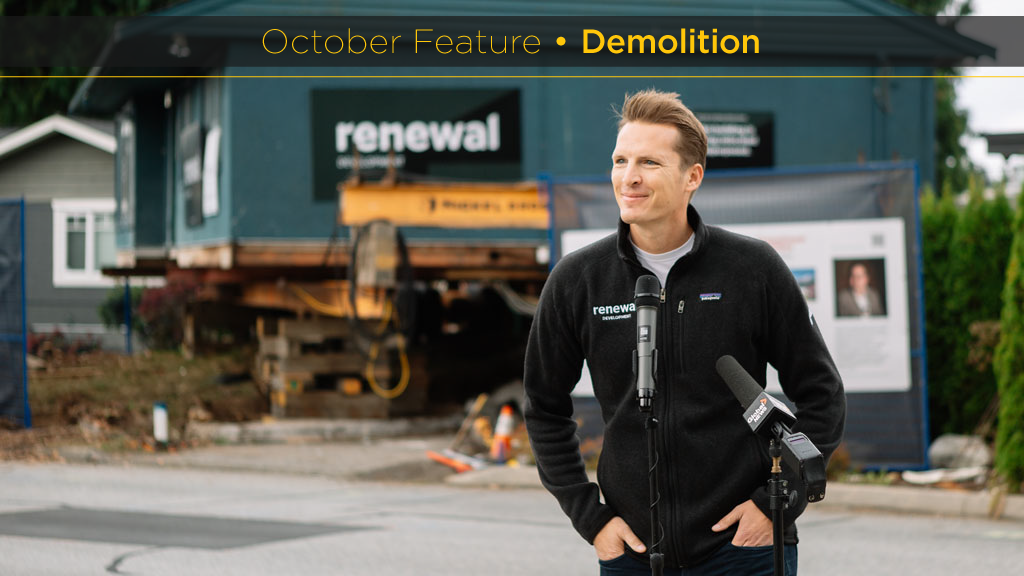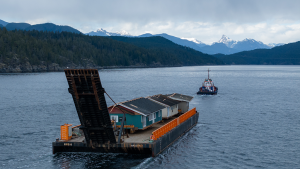Landlocked Vancouver is among the world’s largest demolition centres based upon a per capita population basis, said Glyn Lewis, owner of Renewal Development, a four-year-old company that focuses on relocating homes slated for demolition.
“There is no place to go but up,” he said of such areas as single family homes or old buildings make way for multiple residential units or higher rising buildings.
Lewis said while he understands the densification needs, municipalities need to change the practices associated with conventional demolition.
“It is extremely wasteful,” said Lewis, who holds a master’s degree in sustainable community development.
It is wasteful from a material perspective as many of the pre-1960s homes were built with prime first-growth timber. Demolition does little to mitigate carbon release in the face of climate change and is a waste of usable housing that many coastal communities badly need.
“It is also wasteful financially,” he said as taxpayers pay the cost, eventually dealing with landfill demolition debris over the long term.
“Demolition should be the last option, not the first.”
Lewis estimates every year sees approximately 700 good homes that could have been relocated end up in landfill as Metro Vancouver demolishes annually approximately 2,700 homes.
However, some progress has been made.
Lewis points to the City of Victoria which now has a refundable fee for demolition that goes back to the developer if a set portion of the home’s wood is reused or the home is relocated.
The phased-in, refundable fee of $19,500 started in September 2022 and related to demolished single-family homes and duplexes that were being replaced by like structures.
Homes affected were built before 1960. The second phase of the bylaw, beginning May 12, 2025 applies to all single-family dwellings and duplexes built before 1960 that are being demolished to make way for multiple unit housing.
But, generally governments have been slow to react. Lewis lobbied Burnaby council last year suggesting an early green removal permit, which would uncouple a demolition permit from the development or building permit. It would save four to eight weeks. The green removal permit would make it easier for developers to work with relocation companies such as Renewal Development.
District of North Vancouver Coun. Lisa Muri asked council in September to adopt new policies to repurpose homes being slated for demolition. Her recommendations were based on Renewal Development’s, ‘Home Waste Prevention Strategy: Municipal Action Plan’.
The plan calls for a required assessment to evaluate the relocation or deconstruction to be included in the permit process, an early green removal permit, a $19,500 refundable deposit for pre-1970 homes if relocated or deconstructed, a density bonus for developers relocating old structures, prioritizing relocation of municipal structures over demolition and fast-tracking permits.
The City of Richmond allows owners to list homes for 60 days on their website so relocation companies can attempt to find buyers before the homes are torn down.
That his company is attempting to promote social change isn’t a new role for Lewis, whose comes from a family that has taken in interest in social change. Grandfather Glyn was a former news editor and sports editor of the Fraser Valley’s former mainstay daily, The Columbian. He later became executive assistant to then Surrey MLA Bill Vander Zalm. Father Martin Lewis was a reporter at the paper. Glyn, after graduating SFU with his master’s, opted to volunteer for Barack Obama’s presidential campaign in the U.S.
Following the election, he co-founded with a partner software company New/Mode, a civil advocacy platform now sold internationally.
Lewis said he sold his share in New/Mode and it allowed him to found Renewal Development. Since founding the company, he has been involved in 30 projects with some involving more than one home. He believes the surface has only been scratched and there are more than 2,500 homes each year that can be relocated along the B.C. coast.
Renewal Development has also worked with major developers such as Wesgroup Properties, which acquired 59 single-family homes to build a higher density community at Coronation Park in Port Moody.
Renewal Development assessed the homes and signed a deal with shíshálh Nation leadership to acquire 10 homes in 2024. Lewis said vacation destinations and First Nations lands are target destinations as housing is expensive to build in remote areas. He said he has visited remote First Nations areas where housing is desperately needed.
“There is over-crowding in the homes or they are in very bad shape,” he said.
Lewis said the one-storey home that fits under overhead lines and is road-width or near water is the ideal candidate for relocation. Renewal Development does the abatement preparing it for the transport phase which is undertaken by Nickel Bros., a company that has moved thousands of homes.
Cassidy vander Ros, Nickel Bros. manager of communications, said municipal leaders are beginning to show more interest in relocation rather than demolition.
“Now we just need that enthusiasm to convert to regulation,” she said. “Municipalities need to set the example for prioritizing reducing consumption and reusing materials.”




Recent Comments